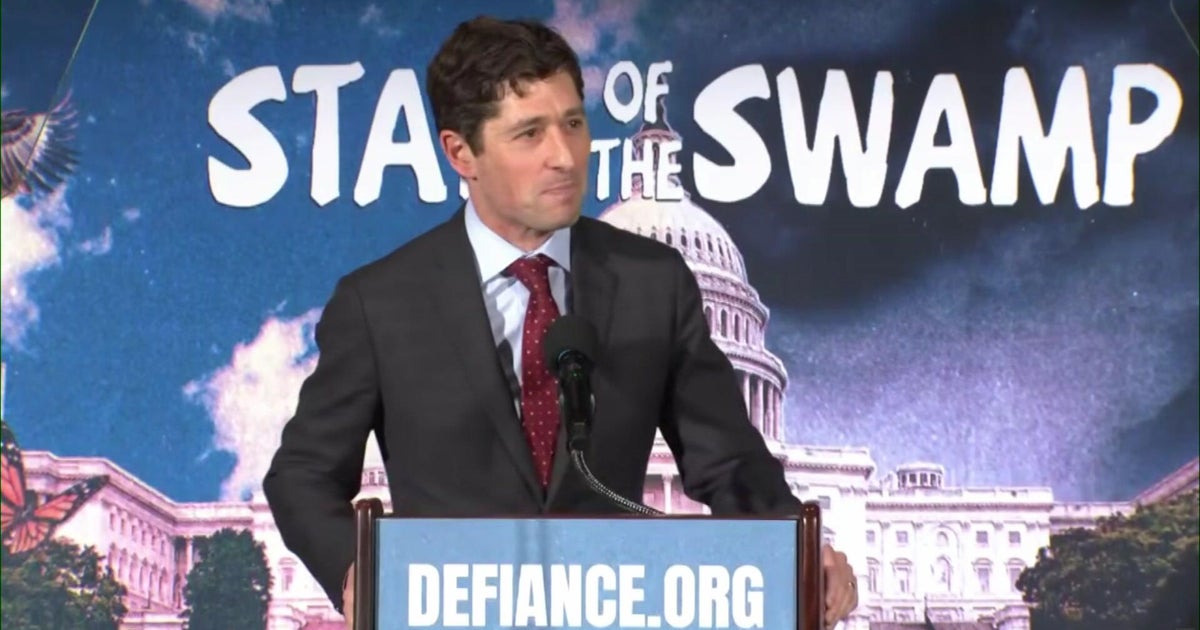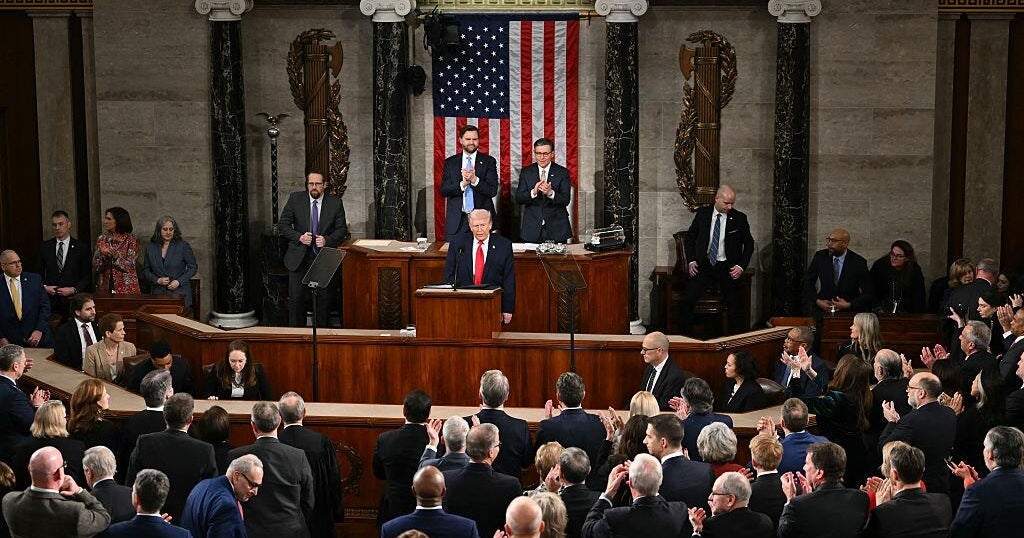Trump names Amy Coney Barrett as his Supreme Court nominee
President Trump on Saturday announced Judge Amy Coney Barrett as his nominee for the Supreme Court seat left vacant by Justice Ruth Bader Ginsburg's death last week, leaving the Republican-controlled Senate little time if they opt to confirm the nominee ahead of Election Day.
Senate Judiciary chair Lindsey Graham announced late Saturday that confirmation hearings would begin on October 12.
"She is a woman of unparalleled achievement, towering intellect, sterling credentials, and unyielding loyalty to the Constitution," Mr. Trump said during his announcement. Mr. Trump praised Barrett and her legal record, telling her, "I looked and I studied and you are very eminently qualified for this job."
Mr. Trump also noted that Barrett, if confirmed, would be the first mother of school-aged children to serve on the court, praising her as a "profoundly devoted mother."
In brief remarks, Barrett honored Ginsburg's memory, and highlighted Ginsburg's friendship with the late Justice Antonin Scalia. Barrett clerked with Scalia before becoming a law professor.
"I fully understand that this is a momentous decision for a president, and if the Senate does me the honor of confirming me, I pledge to discharge the responsibilities of this job to the very best of my ability," Barrett said. "I love the United States and I love the United States Constitution. I am truly humbled by the prospect of serving on the Supreme Court."
Barrett also said that she would be committed to working on behalf of the people if confirmed to the court.
"I would not assume that role for the sake of those in my own circle and certainly not for my own sake. I would assume this role to serve you," Barrett said.
At a rally hours later, Mr. Trump touted that she would "defend your God-given rights and freedoms" to cheers.
Barrett was considered a finalist for the Supreme Court vacancy left by the retirement of Justice Anthony Kennedy in 2018. Justice Brett Kavanaugh was tapped by the president instead.
Senate Majority Leader Mitch McConnell has said the Senate will vote on Mr. Trump's nominee, four years after he blocked President Obama's nomination of Merrick Garland to the Supreme Court because the vacancy occurred in an election year. There were only eight justices on the court for over a year after Scalia's death, until Justice Neil Gorsuch was confirmed in 2017.
In a statement on Saturday, McConnell said that the Senate "will evaluate this nomination on the basis of Judge Barrett's objective qualifications."
"The Court, the Senate, and the American people — not to mention the nominee and her family — deserve a fair process that is focused on Judge Barrett's qualifications. I hope all 100 Senators will treat this serious process with the dignity and respect it should command," McConnell said.
Mr. Trump alluded to the confirmation process in his announcement on Saturday, saying that he expected it to be a "quick" process.
"This should be a straightforward and prompt confirmation," Mr. Trump said. He also appeared to refer to the confirmation process for Kavanaugh, who was accused of sexual misconduct ahead of his confirmation.
"I'm sure it will be extremely non-controversial. We said that the last time, didn't we?" Mr. Trump said.
The Senate Judiciary Committee must hold confirmation hearings with Barrett ahead of the confirmation vote by the full Senate. Although senators typically go home to campaign for reelection in October, two sources familiar with the schedule told CBS News that the committee will hold hearings that month. The tentative plan is to hear opening statements on October 12, have senators question the nominee on October 13 and 14, and hear from outside witnesses on October 15.
Judiciary Committee Chairman Lindsey Graham said in a statement that he was "very committed to ensuring that the nominee gets a challenging, fair, and respectful hearing."
"We move forward on this nomination knowing that the President has picked a highly qualified individual who will serve our nation well on the highest court in the land," Graham said.
However, some Democratic senators on the Judiciary Committee have said that they would not meet with Barrett ahead of her confirmation hearings, bucking tradition. In a statement, Democratic Senator Richard Blumenthal said he would not meet with Barrett because "I refuse to treat this process as legitimate."
If confirmed, Barrett will be the third justice nominated by Mr. Trump appointed to the Supreme Court. It would also expand the conservative majority on the court, widening it to 6 to 3.
The confirmation of another conservative justice could potentially benefit the president in his reelection efforts. The results of the election may not be clear on the night of November 3, raising concerns that the country could see another situation where the election is essentially determined by the Supreme Court. The coronavirus pandemic is expected to lead to a significant uptick in mail-in voting, and there are currently several election-related cases pending in state and federal courts. Mr. Trump has said he wants the seat filled ahead of the election in case the court needs to rule on an election-related case.
The court is also set to hear critical cases on the Affordable Care Act and on grand jury material from former special counsel Robert Mueller's investigation later this fall. Barrett has previously criticized Chief Justice John Roberts for ruling to uphold the ACA in an earlier Supreme Court decision, leading some Democrats to raise concerns that she may be a deciding vote in overturning the landmark health care law in the midst of a global pandemic.
Mr. Trump implicitly referred to the upcoming cases before the court, calling the stakes for Barrett's confirmation "incredibly high."
"The stakes for our country are incredibly high. Rulings that the Supreme Court will issue in the coming years will decide the survival of our Second Amendment, our religious liberty, our public safety and so much more," Mr. Trump said.
Democrats are expected to strongly oppose Barrett's confirmation. In a statement, Vice President Joe Biden, the Democratic nominee for president, highlighted Barrett's apparent opposition to the ACA and criticized Senate Republicans for holding a confirmation vote ahead of Election Day.
"The American people know the U.S. Supreme Court decisions affect their everyday lives. The United States Constitution was designed to give the voters one chance to have their voice heard on who serves on the Court. That moment is now and their voice should be heard. The Senate should not act on this vacancy until after the American people select their next president and the next Congress," Biden said.
Senate Minority Leader Chuck Schumer also critiqued Barrett's record, saying "a vote by any Senator for Judge Amy Coney Barrett is a vote to strike down the Affordable Care Act and eliminate protections for millions of Americans with pre-existing conditions."
"This reprehensible power grab is a cynical attack on the legitimacy of the court. I will strongly oppose this nomination," Schumer said.
Democrats have rankled at what they see as hypocrisy from Republicans, although McConnell argues that the situation is different because the Republican Party now controls both the Senate and the White House. Republican Senators Susan Collins and Lisa Murkowski have both said they oppose holding a confirmation vote ahead of the election. However, even if Collins and Murkowski both voted against confirming the nominee, she would still be confirmed by a slim 51-vote majority, as all other Republicans have expressed support for filling the other seats.
Senator Joe Manchin, one of the three Democrats to support Barrett's confirmation to the circuit court in 2017, said in a statement that he would not vote to confirm any nominee ahead of Election Day.
"I urge my Republican friends to slow down, put people before politics, and give their constituents a chance to vote," Manchin said.
Fury over the turnaround from Republicans on confirming a justice in an election year has led some Democrats to ponder options that recently were considered fringe ideas, most notably adding seats to the Supreme Court. Senate Minority Leader Chuck Schumer told members of his conference that "nothing is off the table" if Democrats retake the Senate, indicating that he is willing to consider expanding the court.
Alan He contributed to this report.



